CHINESE NEW YEAR 2020 25th January 2020 – Year of the Yang Metal Rat (Geng Zi)

© Written by Daniel Hanna 2019

Are you prepared for 2020?
 |  |  |  |
Chinese New Year 2020 – Year of the Yang Metal Rat (Geng Zi)
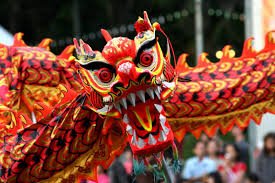
Chinese New Year 2020 begins on the 25th of January according to the lunar calendar and is a very exciting time all around the world by people of all origins for the New Year and celebrations ahead.
Chinese New Year is traditionally a time of honouring family and friends, both past and present and also a time to show appreciation for everything you have in your life. This is also a time to look back and reflect upon your mistakes and failures of the previous year and let it all go with the understanding that the New Chinese Year is a symbol of new starts and opportunities to improve on your previous experiences.
During the run-up to Chinese New Year, you would spend a lot of time around the home and work place giving the building a very deep clean as this signifies a fresh start for everyone in the home or office. The majority of actions you take will usually have some meaning behind them during Chinese New Year, so it is important to do things correctly; sweeping the home symbolises brushing away any ill-fortune or regrets in life and a deep clean is to allow new, fresh Qi to enter your home or office and lift spirts for the year ahead.
The Chinese New Year is the date for big celebrations with family and friends and is always seen as a grand event. Dinner with family precedes the elaborate Dragon processions, fireworks and the handing out of Ang Pow’s (lucky red envelopes). However, the date, which will be 25th January 2020, is not the date to place your 2020 cures and enhancers.
For information on the 2020 Flying stars, you will find full details on THIS LINK. 2020 is an important year with regards to the Flying stars as we have the annual #7 robbery star trapped in the centre which has inherent metal energy and will be strengthening this negative influence without the relevant protection and cures. The combination of the annual star and inherent energy can cause a lot of legal issues, theft and arguments if left alone this year, making this a very important area to get right. The last time we had a Yang Metal Rat (Geng Zi) year was in 1960, making it a cycle of 60 years. A Traditional ‘ten-thousand-year calendar’ will display this cycle.
The Lunar Chinese New Year Day (25th January 2020) is very different from the Solar (Hsia) New Year Day, which falls on February 4th 2020, which I will explain below.

What happens during Chinese New Year?
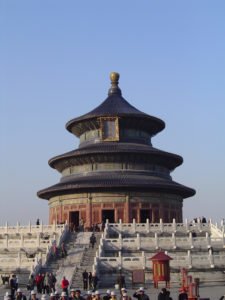
In my family, Chinese New Year has always been a time of the best things in life; amazing meals, spending quality time with family and friends, and in my younger years, receiving Ang Pow’s from older relatives and family friends! Chinese New Year has also been a time of less exciting activities which I would dread in my younger years; tidying my bedroom and getting rid of my old, broken toys. In my older years, I’ve learnt to enjoy cleaning the home and get a huge feeling of accomplishment when the task is done, and everything is in order, although it doesn’t always stay that way after the Chinese New Year for too long.
I’ve always been a massive fan of the famous Dragon and Lion dance where you throw lettuce into the lion’s mouth, and one of my oldest memories is an evening out in a Chinese restaurant in Buckingham with my family and friends, throwing lettuce leaves all around the restaurant, trying to get it in the Lions mouth. Later in the evening, we would go outside and watch the firecrackers light up and spray paper casing all around the ground; it has always been one of my favourite parts of Chinese New Year from a young age.
Although the solar (Hsia) calendar commences the New Year at the beginning of Spring, which usually falls between the 3rd and 4th of February, the lunar (Yueh) calendar marks the New Year on the second new moon after the winter solstice. Celebrations and festivities for the Chinese New Year are held on this date. In 2020, the Lunar Chinese New Year, which also known as ‘Spring Festival,’ falls on the 25th January 2020.
When is Chinese New Year 2020?
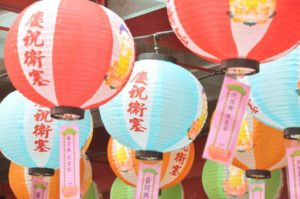
In 2020, you would celebrate Chinese New Year on the 25th of January; this is the date that you would take part in the ancient traditions and festivities with your family and loved ones. Chinese New Year has become a lot more popular in recent years around the world; I will usually go up to London and take part in the festivities around Leicester Square, Chinatown and Trafalgar Square and it’s great to see people from all different walks of life join in and celebrate.
We have had some clients saying that they have come across websites stating that 2020 is the 4717th Chinese New Year although this is not true and we have added the reason behind it, here is an answer and interesting fact for you:
The Yellow King’s appointment was held in the spring of 2697 B.C. But they used the winter solstice day as the first day of the year. So, the first winter solstice took place on around December 23rd, 2698 B.C. Today’s January 1st means nothing to the Yellow King. If we count that extra eight days in 2698 B.C. for a year, then the year 2020 is the 4718th Chinese year.
Interesting Facts for Chinese New Year 2020
The Chinese character signs for the Rat: Geng Zi (gn)
Rat Years: 1936, 1948, 1960, 1972, 1984, 1996, 2008, 2020, 2032
Best careers for the Rat: Salesperson, Financing, Solicitor, Director, Charity
The personality of the Rat: Intelligent, observant, popular with others, calming
Famous Rats: Louis Armstrong, Hugh Grant, Jonathon Ross, Ozzy Osbourne, Samuel L Jackson, Sir Terry Pratchett, Buddy Holly, Avril Lavigne, George, Washington, Josephine Hanna, Gary Lineker, Eminem, George Bush, Lewis Hamilton, Ben Affleck, The Duke of York, Shakespeare, Jude Law, Geri Halliwell, The Prince of Wales
Rat Protection Animal: Ox
Rat conflict Animal: Horse
Auspicious Months for the Rat in 2020: February, May, June, July, and December
Auspicious Flowers for the Rat: Lilies, Streptocarpus
Auspicious Numbers for the Rat: 2, 3
Auspicious colours for the Rat: Green, gold, blue
Auspicious Directions for the Rat: Northeast, Southeast
What should I do to prepare for Chinese New Year 2020?
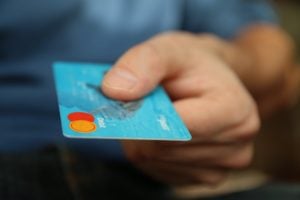
Prepare early! Getting an early start is the best thing I can advise for Chinese New Year as this will allow you to enjoy the festivities a lot more than if you leave everything to the last minute and end up rushing around. The belief is that however, we start the New Year is setting an example of how the rest of the year will be for us, so we must start the New Year right. You should aim to clear any debts before the New Year begins as this can set you up for a year of financial issues and money leaving soon after it comes in; I’m not saying that you have to pay your mortgage off or clear any credit cards, just try to pay people back if they lent you money. The same thing applies to money you have lent to others as this could lead to you constantly handing money out next year; try to collect debts from others.
Another way to start the New Year off right is to retrieve any items you have lent to others over the previous year; the usual culprits are tools, clothing or DVDs. They must be collected before the beginning of the Chinese New Year or else you may find yourself lending for the rest of the year. The same applies to hand back anything that has been lent to you.
A lot of the general rules for Chinese New Year are common sense in that you should enter the year as you wish to go on –
- Avoid drinking too much alcohol
- Try to repay debts
- Avoid swearing or arguing
- Make amends with others before the New Year
- avoid breaking anything
- Try not to hurt yourself

- For as long as I can remember, I have had an endless list of tasks that need doing before the New Year to make sure that the house is scrupulously clean. The cleaning sweeps away stagnant energy that is lying around and creates a fresh, clean environment for health providing, auspicious energy to enter our home. The main areas to make sure are spotless are your windows, in front of the home, main doors, oven and fireplace.
Broken items, including chipped plates and cups, are always thrown away although I must admit I still have a few hand-me-downs that I’m not ready to get rid of yet.
To make this process a bit easier, I designed a Chinese New Year Checklist for everything that needs doing in my home and office before Solar Chinese New Year (25th January 2020). This checklist is available for download by CLICKING HERE.
I’ve finished cleaning my home, now what?

After I am finished cleaning everything, I make sure that I pack all the equipment away and empty the hoover etc. Everything, including brooms, dustpans, and brushes, hoovers (vacuum cleaners), dusters and all cleaning cloths. Make sure they are placed out of sight to allow the new, fresh, vibrant energy to flow through unencumbered. Avoid shuffling everything into the corner of the kitchen or living (lounge) room if possible although if you have to do this, try to make sure there is order among the chaos.
Colours play a big part in Chinese New Year, and red colouring will usually be placed all around the home to promote good fortune, fame and riches for the year ahead.
If used correctly, red can give excellent results, so a good tip is to keep the colours you choose to use as natural as possible unless you are confident of the elements and their associated colours and usage in Feng Shui. Please take a look at our 2020 Flying Star Analysis to find out where red can be used in 2020.
Protective talismans

The build-up to Chinese New Year is also a critical time to renew your protective talismans which should be used to ward off evil throughout the home or workplace during the year (click here to find out why you place these talisman charms and also to download a free printable copy). People from all over the world will do this by decorating their home with auspicious couplets and talismans with the additional aim to summon good fortune. These talismans will be printed on thick paper in red or with a red background. In Chinese culture, the colour red is seen as a life-giving colour, associated with summer, the south and the vermilion bird, which is similar to a phoenix (oddly symbolic enough of rebirth in the west too) and represents the fire element.
The use of Flowers and plants during Chinese New Year

Another important factor of Chinese New Year is the use of flowers and plants around the home and work place; you would place bright, live, fresh, and healthy blooming plants around your home or business as a symbol of rebirth and new growth during Chinese New Year and throughout the year. The most commonly placed plants during Chinese New Year are bamboo, peonies, plum blossom and chrysanthemum as they all symbolise wealth and high position in a person’s career.
A lack of flowers and plants in your home during Chinese New Year is said to result in a lack of fruit during the year ahead. Another common belief is that if a plant blooms when inside a home of office on New Year’s Day, this will bring luck to the entire home or office for all occupants for the year ahead. Don’t forget to include lots of plants around your home. Plum Blossoms and Bamboo are also displayed in the house and business to symbolise perseverance, reliability, and longevity.
The use of Fruit during Chinese New Year
Fruit also plays a very important role during Chinese New Year, and it is encouraged to place a bowl of fruit in your kitchen, dining room or main table. The best fruit to display in your home of office during Chinese New Year is eight oranges or tangerines in a bowl; the citrus smells will fill the home and leave the occupants feeling relaxed, and the presence of these fruits symbolise abundant happiness. The colour of these zesty fruits also represents gold and combining with a ‘hung bao’ and ang pow (red lucky packet containing money), they are offered to friends and family as gifts symbolising gold ingots. Every year, my parents come over to my home and bring two fresh nets of oranges for me and vice versa.
Kitchen God
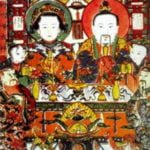
About a week before Lunar New Year, traditional families will be very busy preparing the religious ceremony which is performed with tributes and offerings in honour of Heaven (Tien Shen) and Earth (Ti Tu), and of the various deities of the household together with family ancestors. One of the most well know deities associated with the Chinese New Year is the Kitchen God (also known as stove god).
The Kitchen God resides over the stove and is said to keep an eye on the interactions of the household, making an annual report on what the family has done in the past year to the Jade Emperor in Heaven around about a week before Chinese New Year Day. Rites and offerings are made to the Kitchen God (Zhou Khun) on this day with hopes that he will speak well of the deeds of the family.
The reunion dinner
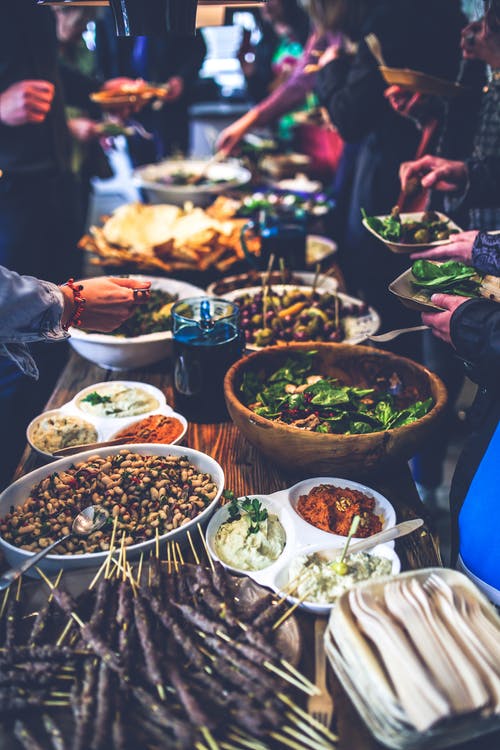 One of the main events, leading up to Chinese New Year is the ‘Reunion Dinner’ where a large, banquet is laid out in the family home to celebrate the upcoming New Year. Traditionally, all of the family will gather at the parents or grandparents’ home for the meal as this represents family harmony and will usually be a very joyous event of reunion and fun.
One of the main events, leading up to Chinese New Year is the ‘Reunion Dinner’ where a large, banquet is laid out in the family home to celebrate the upcoming New Year. Traditionally, all of the family will gather at the parents or grandparents’ home for the meal as this represents family harmony and will usually be a very joyous event of reunion and fun.
You will find all of the family making an effort to return to their family home, even travelling abroad to get back in time for Chinese New Year and it is not uncommon for flight prices to get much higher around this time. For married couples, it is customary for the wife to visit husband’s family home for the reunion dinner although this has become a lot more relaxed in recent years and you will usually have a couple visit both families home during the day and evening.
The reunion dinner will usually have a tremendous feast spreading across the whole dinner table, filled with unique, delicious, and fascinating dishes and delicacies, all bearing a different auspicious meaning. The beginning of the dinner will take place at the alter where the whole family will say a prayer of tribute to their ancestors and deities and give offerings. The reunion dinner is a very colourful and lively affair with every light in the house left on to ward off evil spirits.
Most dishes served during the reunion dinner will have a meaning behind them, such as:
- Ginkgo nuts at the dinner table representing gold ingots and are said to bring luck with fertility.
- Black moss seaweed is a visually beautiful dish representing prosperity.
- A whole chicken at the dinner table is seen as a symbol of wealth.
- Dried bean curd is served at the banquet table to promote happiness and luck.
- Lotus seed is also said to increase fertility luck and signifies multiple offspring in the year ahead when eating during the reunion dinner.
- Nian Gao is a traditional sweet, steamed glutinous rice pudding that is said to aid growth and abundance.
- Bamboo shoots will be placed as to when you translate into Chinese; the words sound similar to the Chinese for “Hoping that all turns out for the best”.
- A whole fish with the head and tail still intact will represent togetherness throughout the year.
Before sitting down for the meal, the women will traditionally gather in the kitchen to prepare the dishes while the men will either sit together, watching TV or will take part in endless games of Mahjong, the game played by men and women alike at a table, building a wall of tiles and taking turns to eventually form four suits and a pair. Mahjong is considered gambling with huge sums of money exchanging hands between players. You will need a very good memory to master Mahjong as you will need to remember which tiles have been laid down and which remain.
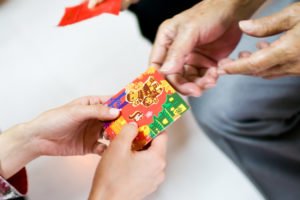
The children will be washed and dressed in their new pyjamas which will be replaced before the reunion dinner. In their bed, with promises that ‘Tsai Shen Yeh’, the wealth god, will arrive once asleep, the children will drift off with the expectation to awake to an Ang Pow under their pillow. The custom of the Ang Pow is very similar to the tooth fairy in western culture.
The children will also usually receive an Ang Pow red envelope from their grandparents and older family members on Chinese New Year. It’s also common for children to receive more money when they get older.
Parents will gift more than an aunt or uncle. Someone who has a large family and who has taken a defeat on the mah-jong tables is in for trouble!
At midnight, during the turn of the old and New Year, it’s a common tradition in China and throughout the world, to hear the bangs of Chinese firecrackers and fireworks which are used to ward away the evil spirits (Nian monster). The fireworks also signify the old energy (Qi) passing and the welcoming of the new Qi. Unfortunately, fireworks are banned in the UK without permission from the council during this time of year. China is also considering banning the use of fireworks during Chinese New Year to control pollution.
Although fireworks have been banned in some countries such as the UK, one tradition that is still going strong is the Dragon dance. At these ceremonies, you will find a group of performers from one to 10 people dressed as a giant dragon, dancing along to the rhythm of deafening music. The performers in the dragon costume will raise and lower a series of poles to make the dragon dance around, chasing the pearl of wisdom. The pearl will serve as a temptation for the dragon to search for wisdom and knowledge as he follows it to the sound of the thundering drums. The drums seem to help fill the void of the firecrackers, the energy is pumping and everyone, old and young, are thrilled by the event.
The tradition of the Dragon Dance during Chinese New Year
Traditionally, the Dragon dance was used as a ceremonial practice to pay respect to and worship ancestors and pray for rain throughout the year for the crop to grow; this practice can be traced as far back as the Han Dynasty )202BC – 22AD). In later years, the Dragon dance became better known for entertainment, rather than a dance of worship and respect of ancestors and in the Tang and Song Dynasty, this became a regular ceremony and crucial part of celebrating Chinese New Year.
Traditionally, the dragon costume will be stored in a dragon king temple throughout the year and would be collected from the temple on the day of the performance by the team of skilled dancers. The role of the dancers is not for everyone and takes a lot of practise to learn how to follow the beat of the drum, especially if they are part of a longer dragon with many dancers inside the dragon’s body. As well as the dancers, you will also have the drummers carrying banners and flags.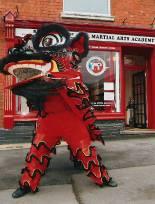
The Dragon dance comes with some interesting practices, and each has a different meaning.
- The body is attached to the head and is known as the ‘eye pointing’ ceremony
- You will have a performer walking in front of the dragon holding a long pole with a large ball at the end, signifying the pearl of wisdom and the dragon will follow it’s every move
- When the dance is finished, the traditional practice is to burn the dragons head and tail and then return the dragon’s body to the dragon king temple. this is believed to return the dragon to ‘dragon heaven’ and bring good weather for crops in the year ahead
- Another common belief is that the burning dragon will repel bad luck and disasters for the year ahead.
What does the Lion dance have to do with Chinese New Year?
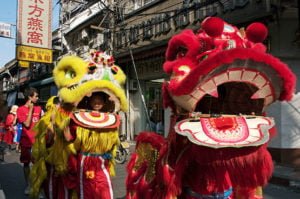
The Lion dance, which also goes by the name of the lion lantern is a stunning and traditional dance which takes place on Chinese New Year. The Lion dance will usually be performed by two men or teenagers and they will climb into a lion costume with one person as the head and one as the body and will dance around together in tune to a beating drum and gong, imitating a real lions body movement. On the top of the head of the Lion, there will be a mirror placed which is said to scare away evil spirits wherever the dance is taking place.
The Lion will dance his way down a street and will be greeted by a laughing Buddha dressed in a monk’s robe and mask, holding a fan made of banana leaves and will tease the lion by waving the fan around the lion’s face. If you have seen a traditional Lion dance take place, you may remember seeing lots of lettuce all over the place; people will hang lettuce above their home or business and attach money to thank the lion and wish for luck and prosperity in the year ahead. The Lion will dance all around the street looking for the lettuce and will take the money and spit the lettuce leaves all down the street as this symbolises new beginnings for the new Chinese Year; it is considered to be very lucky if the lion takes lettuce from your home or work place.
Common practices during day One of Chinese New Year
During the first day of Chinese New Year, you would begin the celebrations with good wishes to friends and family members and will be dressed in your finest new clothes. The first day of Chinese New Year will be the day that Ang Pow’s with money inside are handed out to children and unmarried adults by the older generation and married couples. The practice is similar to the way that we give out presents such as toys or clothes in the UK at Christmas although the custom is to give a red envelope with money inside during the Chinese New Year rather than a gift of toys etc. The amount of money that is placed inside an Ang Pow should be even numbers as this is considered to be auspicious except for when using a single Chinese I-Ching coin on its own. For example, it could be two dollars, ten or twenty dollars. It’s staggering how much money a person, young or old, can receive in a day from family and friends. For more information on red envelopes and their use in Chinese culture the link below details http://www.fengshuiweb.co.uk/advice/angpow.htm
As the day goes on, you would be expected to all venture out of your family home and visit family such as aunts and uncles and so on. The common practice for this is to visit family in age order with the eldest family members having a visitor earlier in the day to wish each other good wishes. These visits are very exciting for children who understand the ritual. Every greeting of “Kung Xee Fa Chai” (Congratulations and May you be Prosperous) will result in an Ang Pow (red envelope containing money).
What happens on day Two of Chinese New Year?

The second day of the Chinese New Year is referred to as ‘Kai Nien’ which translates to ‘year beginning’, and you would begin Kai Nien with a very early breakfast with your family; the whole event of Chinese New Year is very much a family affair!
During the main meal, you would traditionally eat a range of unique dishes, all with symbolic names and meaning behind each dish. The main focus on this meal will be based around a bowl of long noodles which will be tossed into the air by everyone at the table using their chopsticks; this is a symbolic activity to promote longevity, and those who are unable to join in will watch the rest of the family stand, raise their arms and toss the noodles into the air which will usually result in noodles stuck to the ceiling!
Unlike western culture, alcohol is generally not consumed too much, if at all, during Chinese New Year celebrations as it is considered that too much alcohol will lead to problems in the year ahead. The drink of choice when celebrating Chinese New Year is usually copious amounts of green tea and maybe a small amount of Chinese wine with the meal. This day is viewed as a family event and not an appropriate occasion to get drunk.
The first two days of Chinese New Year involve eating a great along with exciting fun and game with family which can be quite tiring; the Chinese don’t hold back on these occasions and always go all out when celebrating. The Chinese have a very special relationship with food throughout the year but at no time more so than at New Year. Many of the dishes served during Chinese New Year will hold special significance; even everyday dishes like fish and turnips have special meanings and none more so than fish balls and meatballs, both of which suggest a reunion.
What happens on day Three of Chinese New Year?
After two days of celebrations and festivities, even the most spirited Chinese New Year veterans will begin to feel the effects and become aware that it’s time for a respite to restore and revitalise. Traditionally, this is not a day for being adventurous or energetic, and the young ones will usually go out to visit friends, but it’s predominantly a quiet day for everyone. The custom is that no offices or businesses will be open on this day.
What happens on day Four of Chinese New Year?
On the fourth day of Chinese New Year, normality will usually start to return. Companies, shops, and stores will reopen for business. Many businesses will choose a specific day for opening, and they’ll utilise the services of a Feng Shui Practioner for a date selection. Many companies will organise a spectacular display of lion dance and firecrackers. Once again, it’s a booming, boisterous and exciting event for both employer, employees and passers-by. The lion dance on this occasion is said to bring prosperity to the company.
Chinese New Year continued.
Chinese New Year celebrations will continue for another eleven days right through to the full moon festival of the first lunar month when the ‘Spring lantern festival’ (Yuan Xiao Jie) will take place on the fifteenth day. The impressive ceremony will take place under a full moon.
During the Spring lantern festival, every generation, no matter how old or young will carry a beautiful, colourful lantern and will gather in a public area such as the town centre to admire and appreciate the first full moon of the year; this is similar to the Mid-Autumn festival. In China, there are still villages that hold large Tang Yuan (rice dumplings) cooking and eating sessions which I would love to attend one year. The dumplings are round to symbolise family unity and togetherness. The mid-month spring lantern festival brings the seasonal passage of the New Year to an end.
What can I do before the New Year to achieve good luck?
- Make sure that your house, flat, workplace, shop or any other building is spotless from top to bottom, to encourage good luck in the coming year. On average, just before New Year, we take 2-3 days cleaning every single area of our home, which is quite a time consuming activity but feels fabulous after.
- You should not wash or cut your hair on the first few days of the New Year; this is because “Hair” is a homophone for the word “fa” meaning “prosperity” in Chinese. Therefore “cut the hair” or “wash the hair” is perceived as “cut your prosperity” or “wash your prosperity away”. This is something we have done for as long as I can remember.
- Make sure that you have all of your Cures and Enhancers cleansed and prepared for the 4th February and be sure to check our world time converter to find out when to place your Cures and Enhancers for 2020, year of the Yang Metal Rat (Geng Zi).
- You should open all the windows and doors in every single part of the home as this is said to bring in clean, new good luck for the year.
- Do not talk about death or anything negative on the first few days of the year and, in modern days, horror films or any film with negative connotations would never be watched.
- Do not purchase books in the first few days in Chinese New Year. “Book” is a homophone for the word “shu” meaning “loss” in Chinese.
- Do not cry on the first few days of the New Year or raise your voice to your children or any other member of your family. It is believed this will set the year ahead.
- You should switch on all of the lights in the home inside and out as this is said to attract good luck from outside and if the windows and doors are wide open it is easy for the luck to enter. The bright lights and open windows are also used to scare away evil spirits.
- Many people, especially Chinese, will buy a new pair of slippers at New Year. It is believed that this purchase will prevent people from gossiping about you. In China, face and reputation are very important.
- This is quite normal all around the earth, but one thing the Chinese spend a lot of time doing before New Year is bathing and they cover themselves with Pomelo leaves to enhance their health for the year. Pomelo is the largest of citrus trees, and they grow as large as a bowling ball and are said to be very healthy to drink and eat.
- The Chinese believe that whatever happens to them on New Year’s Day sets how the year ahead will be for them; this is why they avoid arguments, use knives or drive too far. They love to gamble on New Year’s Day as they hope to create good luck and wealth. You can read more on this below.
Some rules and regulations the Chinese stick to on the Chinese New Year Day
- Everybody is in a celebratory mood over Chinese New Year’s, so, people should not argue or disagree with each other.
- Parents should not punish or discipline the children. Otherwise, they will have more arguments during the New Year.
- Women should refrain from using a knife or scissors in the kitchen. The knife signifies anger and danger in the woman’s life and the scissors predict the woman cutting people out of her life. Women do not prepare or cook meals on this day but eat leftovers and pre-prepared food from the day before instead.
- It is considered bad luck if you smash a plate, bowl, cup or any other similar kitchen crockery; this brings bad luck regarding finances throughout the year. All smashed and cracked crockery should be placed in a round container until the next rubbish collection day.
- It is said that if you were to sweep up rubbish or throw away rubbish on Chinese New Year’s Day, you would be sweeping or throwing away the wealth and luck that resides in your home so please don’t do any cleaning.
- Do not take a lunchtime nap on this day as this will encourage laziness throughout the whole year ahead.
- You should not wash on this day which means don’t take a bath, shower or wash your hair on Chinese New Year’s Day as this will wash away all good luck for you.
- Refrain from wearing black or white colours when visiting friends on this day as these colours are associated with funerals and death.
- Do not eat rice or oat porridge for breakfast on this day as rice or oat porridge is associated with the poor eating these meals in the past; this symbolises a loss of wealth. A good breakfast would be fruit.
- If somebody that you know or know of has recently passed away, it is not advisable to visit a family member’s house that is connected to the recently deceased as this could bring bad luck in 2020.
- Do not eat any meat during breakfast on this day. Many vegetarian Gods arrive at the Chinese New Year’s Day festival and upsetting them could cause problems.
- When you wake somebody up on this morning, do not use their name as it is said that this person will be dependent on you all year long to motivate them.
- Refrain from taking medicine on this day (if possible) that is not essential for your health as this could symbolise weakness and could bring illness to you throughout some point of the year. Necessary medication must still be taken as usual.
- Do not wash any clothes on this day as Chinese New Year Day is the birthday of the god of Water.
- Do not collect any debts on this day as you may find that you will be chasing money for the rest of 2020.
- Do not let anybody take anything out of your pockets, purse, handbag or wallet as this symbolises money loss throughout the year, and please be careful when out as pick-pockets can also cause problems with this.
- Do not cut your hair or nails on this day as it is believed that you will be bringing pain to your relations.
- Do not buy any shoes as it’s considered very unlucky; ‘shoe’ translated in Mandarin means evil and when translated in Cantonese means ‘rough’ although slippers are fine.
- Keep everything positive and do not talk about anything negative on this day as you will be setting an example for how the rest of your year is to be lived.
- When offering something, do not do so in fours; when ‘four’ is translated into Chinese, it sounds like death. An example would be not to place 4 or 24 – 34 04 worse still 44 pounds/dollars in a red envelope
The understanding is that whatever you do on Chinese New Year, is what you will be doing for the rest of the year, so enjoy time with family and eat well.
You can download a checklist of everything that needs to be done, click here Checklist for Chinese New Year 2020
I hope you have enjoyed reading this and would like to wish you all a very happy, successful and lucky new year in 2020. There are many links below related to the Chinese New Year and traditions.
Are you prepared for 2020?
 |  |  |  |
Visit the pages below for further details on 2020 Chinese New Year etc.
Chinese New Year 2020 ** Checklist for Chinese New Year 2020 ** How to make your own Ang Pow **Chinese Talismans for 2020 ** Chinese animal predictions for 2020 ** Flying star Xuan Kong 2020 ** Avoid the fury of the Grand Duke, three killing 2020 ** Chinese New Year world time converter 2020 ** 2020 Cures and enhancers kits ** How to take a compass reading ** How to determine your facing direction ** Feng Shui software ** Feng Shui resource ** 2020 Tong Shu Almanac Software ** Feng Shui Blog ** Chinese culture **









Hello, Daniel! Happy Year of Geng Zi! THANK YOU FOR YOU HARD WORK EACH NEW YEAR to bring us all the information and cures we need to help the New Year be a good one for us.
My query: I work with Reiki healing candles. According to our home placement, the only place I can burn these is now in the garage! Not safe….not nice….
Is there another room that might benefit from the Fire energy of these sacred candles?
Really need your help on this one. Just can’t figure out a new place for my home altar.
Thanks for your help! Cathe
Hi Catherine,
The best thing I can advise is to follow the monthly flying star analysis throughout the year for recommendations on where to burn candles each month.
Here is the link where you can find the analysis each month https://www.fengshuiweb.co.uk/advice/teachyourselffengshui.htm
I hope this helps.
Kind regards,
Daniel
When can we start cleaning , shopping etc
Hi Kathleen,
You can carry on with your normal activities as of today.
I hope this helps.
Kind regards,
Daniel
Hello and Happy New Year!
What is the best area of the home or office to have a fountain this year? I’m moving my fountain away from the front entrance as it is in the East area and wondering where to relocate it outside.
Thank you,
Samyar
Hi Samyar,
The best area for a water feature in 2020 is in the northwest for the annual #8 star.
Kind regards,
Daniel
Can I have a party with friends on the 8th day of Chinese New Years..say Jan 31 or Feb 1st?
Hi Amelia,
That will be fine to have a party on either date.
I hope you enjoy the party 🙂
Kind regards,
Daniel